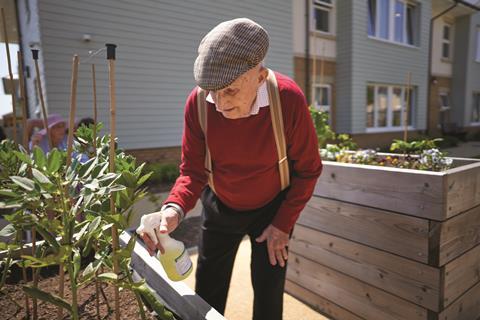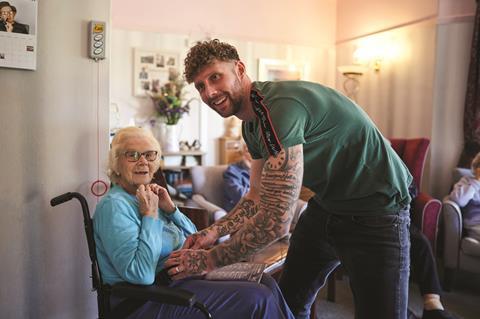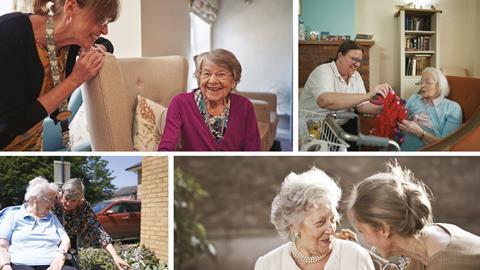Christian carer Tim Byron shares heartwarming stories of how God is at work among those with dementia, and says churches have a vital role to play in showing love towards its senior members
I started working in a care home a year after we had emerged from the last Covid-19 lockdown. During my first week, a lady from the local parish church came by to give the residents communion. I will always remember Elizabeth’s tears as we took the bread and wine together in her room. She felt that she had been forgotten about; the two and half years of pandemic had been very lonely ones for her. Being reconnected to the Church meant so much. Elizabeth has access to regular communion now and, for her 94th birthday, we took her to the local church to join the service. At the end, as the congregation sang ‘Happy birthday’ to her, I looked up to see the same tears flowing again.
The beautiful, multicoloured blanket she received as a birthday present from the parishioners clearly meant so much. Even now, many months on, she still proudly shows it off to visitors! But it was that sense of being connected to others – through the Church – that meant more than anything. In fact, I’m convinced this connection is extending Elizabeth’s life. It’s helping stave off the dementia for as long as possible. And even though she is starting to forget, she knows that God has not forgotten her, and I try to remind her about that daily, too.
AGEING POPULATION
In Britain we are living longer than ever. In 1841, the average life expectancy was 40.2 years for men and 42.3 years for women. By 2019, this had risen to 79.9 years for men and 83.6 years for women. We have just experienced a slight fall of about a year (due to Covid-19) but, nevertheless, on average you and I will live twice as long as we would have done 150 years ago.
As wealthy, more developed countries like Britain are ageing, the often-distressing experience of brain change, and learning to live with and adapt to it, is becoming more and more prevalent. In the past, we would talk about ‘senility’ – when older people find it more difficult to think clearly, communicate or remember things. However, we now live in a golden age of neuroscience; we can study the human brain in incredible detail. This has led to the use of the term ‘dementia’ which describes, in general terms, a wide variety of specific diseases of the brain (Alzheimer’s disease is the most common and most familiar of these). Typical symptoms include an impairment in the ability to remember, think or make decisions that interferes with doing everyday activities or living independently.

Christian caring
The spread of dementia is like the slow creep of an incoming tide. It’s one of the most profound and yet least talked about changes in our society.
Dementia often has the cruel effect of isolating and marginalising people at the end of their lives. But many of those hidden away in our care homes are visited by volunteers from local churches who befriend and pray with residents, lead singing, arts and crafts activities or facilitate church services and communion.
Since working in a care home, I have been inspired by the quality of care that is given to our residents with dementia, and it is notable how many carers are motivated by their faith – and how this inspires them to treat people with such dignity. When you add up the good work of local churches and people of faith working in the sector, the Christian response to dementia is widespread and inspiring. We have excellent theological foundations for taking a lead in this area, especially when you look at the repeated call of the Old Testament prophets to care for the vulnerable, or in biblical language, the widows, orphans and strangers (see Deuteronomy 24:19).
Even though she is starting to forget, she knows that God has not forgotten her
Many of our carers are from overseas. My Nigerian and Indian colleagues often have a strong faith motivation. Our belief in the innate dignity of everyone is fundamental. This is clear on the ‘floor’ which is where the cutting edge of care takes place from day to day. One colleague in our home started as a cleaner and quickly rose through the ranks to become a senior carer, taking on more and more responsibilities. When I asked her how her faith informs her work, she replied: “When my children leave home in the morning I say to them, ‘Do good, be good and do everything as if you are doing it unto the Lord.’”
Our belief in the dignity of the individual has its roots in a Christian ethic
The power of music
Some people who have dementia experience a growing sense of agitation or anxiety in the afternoon or evening. It’s a phenomenon known as ‘sundowning’, and one of the ladies we work with often experiences this around 3pm, feeling very strongly that she is in the wrong place. She might say she needs to go home, or that she needs to pick the children up from school, even though her children are now adults. Other symptoms might include shouting, arguing, pacing or becoming confused about who people are or what’s going on around them. We think the lady in our home experiences sundowning because, for so much of her life, she would be collecting her kids or preparing for them to return home at that time of day. She gets agitated as her body tells her she should be doing something, but she doesn’t know what. However, if we hold a hymn service around that time, she becomes noticeably calmer.
Delaying dementia
Currently, there is no cure for dementia. However, drugs have recently been developed that offer promising results in delaying its effects. Reducing alcohol consumption, maintaining moderate physical activity and, perhaps most importantly, high levels of social interaction, have all been posited as ways to delay the onset of dementia.
An intriguing study from the University of Yale in the 1980s claimed that religious attendance also predicted less cognitive dysfunction (Van Ness and Kassl). This was followed by a Canadian study in 2005 that suggested religious involvement may slow down the progression of Alzheimer’s disease (Kaufmann and Freedman).
There have been many studies since then that have echoed similar findings – and social engagement seems to be key in all of them. As we meet people, have a conversation (even if limited to small talk), read body language, pick up social cues and interpret tone of voice, the brain is working exceptionally hard. Activities such as attending a church service or reflecting on liturgy and scripture also keeps our brains active, rather than slumping on the sofa in front of the television!
A wonderful lady who regularly visits our care home knitted a nativity scene for our Christmas carol service. As the Nativity story was being read, our residents with dementia were each able to place a character in the crib. The local vicar, who led the service, brought his niece who is training to be a professional singer. I had placed myself between two of our residents who were most likely to be disruptive. It took about 20 minutes to get Barbara, who has acute care needs, to gently sit up straight. My interaction with Barbara was always very limited – it was almost impossible to have a conversation with her and she had never used my name before. But as the vicar’s niece sung ‘O holy night’, she leaned over and said: “Tim, do you think that angel will come and speak to me at the end of the service?” It moved me to tears as I realised the music was helping her communicate in brand new ways.
It’s not the only example. When I was designing our first Sunday service, I sat down next to Barbara while choosing the hymns. I quietly sang ‘All things bright and beautiful’, just to check I could hold the tune and lead it. As I did so, she joined in and started singing with me! The other carers’ eyes popped out of their heads in amazement! No one had been able to have a meaningful connection with her until then. It was only afterwards, as I reflected, that I realised she had probably sung that song as a little girl every morning in her school assemblies. That memory was still there in her fragile brain and it brought a smile to many faces that day.

Ways forward
The Church of England recently released the Archbishops’ report on social care, Care and Support Reimagined: A National Care Covenant. It highlighted the lack of clarity about what should be reasonably expected from families, and how the costs of care are shared between individuals, their relatives and the state. It challenges us to rethink attitudes to care and support – to rebalance the roles and responsibilities and radically redesign the system.
Attending a church service or reflecting on liturgy keeps our brains active
Maybe an answer can be found by looking at the history of the Church itself. Our modern welfare state has taken away many caring responsibilities that would have traditionally been outworked by a person’s family, whether biological or spiritual. In the 20th century a ‘duty of care’ outside of the family structure was first enshrined in UK law. Until then, negligence could only be established within a contractual relationship. But the idea that an individual may owe a stranger a duty of care that they do not suffer unreasonable harm or loss is one of many ways that Christianity has shaped our country. As historian Tom Holland noted in his influential book Dominion (Little, Brown), it is Judeo-Christian values that lie at the heart of our modern society’s laws, norms and values. With regards to dementia, our desire to provide good-quality care for people outside of the family structure is based on our belief in the dignity of the individual – and this did not emerge from secularism but has its roots in a Christian ethic.
Hospitals and hospices were created by Christian communities, and were often attached to monasteries linked to some of the great pilgrimage routes to Jerusalem, Santiago or Canterbury. Organised nursing visits (the beginnings of the district nurse) can be traced back to the Victorian era in Liverpool, emerging from Christian philanthropy. Recent years have seen the creation of movements such as the Methodist Homes for the Aged (1943) and The Abbeyfield Society (1956), with their expression of wrap-around care from a resident Christian community.
The Western monastic tradition spread throughout Europe through the influence of the Italian monk Benedict of Nursia. A key part of the Benedictine spirituality was to offer a balanced way of life – particularly with respect to contemplative prayer and active work (known as Ora et Labore). The sacred nature of the day was marked by the eight canonical ‘hours’ (ie by meeting for common prayer throughout the day from early morning to the great silence of night).
I have heard people describing care homes as being “God’s waiting room”. Would it be possible to imagine more explicitly Christian waiting rooms, such as those run by organisations such as Pilgrims’ Friend Society, becoming more common? When high-quality care is accompanied by communal prayer, worship and Christian fellowship, we can truly extend a dignity of care to all who pass through them.




































No comments yet